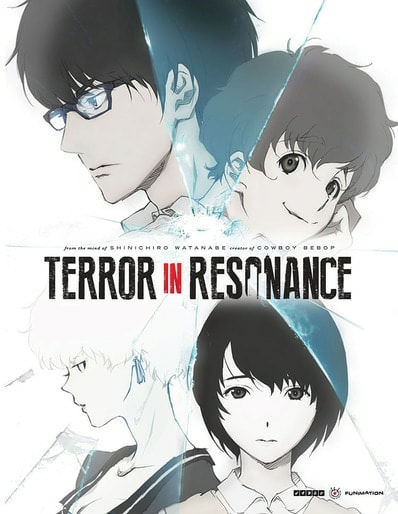TiR is, on the surface, the story of two genius teenagers wreaking havoc and spreading terror throughout Tokyo. This is done through a series of brilliant bombings, clever media manipulation and a kind of charming audacity that the public--of any nation--tends to love in its villains.
But, of course, there's much more to the story than that.
While we see these two boys transferring into a normal high school in the first episode, giving normal-sounding names to their new classmates, we are also shown almost immediately that their normalcy is a mask they wear, just like the literal masks they wear in their internet videos taunting the police, going by the collective name Sphinx. In fact, they don't even have names, not real ones, anyway, and refer to each other as Nine and Twelve. Their motivation is unclear, for most of the series in fact (though we get inklings of terrible trauma in their past right from the start), but it's also clear that they aren't just bored geniuses playing around, as these kinds of villains frequently are in anime and comics. They have a message that the world needs to hear and they feel this is the only way they make the rest of us listen.
TiR is set in the "real" world and taps into some deeply-seated fears of modern Japan, namely, terrorism and the country's place in the world. Japan is one of the most peaceful nations on Earth: it's economically prosperous, it isn't subject to the kind of internal or external strife (political or military) that most of the western world is seemingly constantly involved in. And it's precisely those reasons, along with the fact that its closest ally is the U.S., that make many Japanese fear they will become the target for terrorist attacks. At the same time, there is a feeling among a small, but vocal, minority in Japan that while the second World War may be long over, and the physical scars from it may have healed, their nation's soul still hasn't, that they have spent seventy years under the U.S.'s thumb, living in our shadow as a defeated nation "without dignity or sense of self", as someone puts it in TiR.
Those are real, valid feelings. Even if some people wouldn't agree with them, it's a legitimate perspective to take.
I honestly can't say as much as I want to say about this series without spoiling key information, both because the series is so short (only 11 episodes; an unusually small number for a TV anime) and because what I want to talk about hinges on extremely important plot points weaving real-world issues into the narrative, but let me say this:
TiR is, ultimately, an incredibly powerful story about three separate groups, each with noble goals, doing terrible things to try to achieve them, and coming into conflict with each other in the process.
And let me add this as well: the first time I watched it, I had tears in my eyes when the final episode was over. It's that powerful a story.
Beyond the story aspects, the animation in this is gorgeous. It's not the most amazing animation I've ever seen, but it's certainly the best-looking TV anime I've seen in a long time. Possibly ever. Perhaps because of the relatively-short number of episodes, they had more money to spend--I don't know--but the animation quality is nearly on par with big budget theatrical releases. On BluRay, on a TV screen capable of taking advantage of the format to its fullest extent, it's just gorgeous.
Please, please do yourself a favor and watch this series.
And take my recommendation, if at all possible, and watch it in as few sittings as you can manage. The first time I watched it, I intended to watch an episode or two and became so engrossed I watched the first five episodes in my first sitting. I finished off the other six in two more sittings, and that was pacing myself; I would have watched all six remaining episodes the second night except that it meant there'd be no more for me to watch.


 RSS Feed
RSS Feed